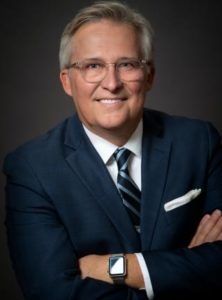Legal immigration can help offset projected declines in the American workforce due to ongoing Baby Boomer retirements, aging workers and diminishing birthrates, a U.S. economist said in a recent episode of the “Good God Project” podcast with George Mason.
 “We’re looking at potentially slower labor force growth, which means substantially slower economic growth,” said Pia Orrenius, vice president and senior economist with the Federal Reserve Bank in Dallas.
“We’re looking at potentially slower labor force growth, which means substantially slower economic growth,” said Pia Orrenius, vice president and senior economist with the Federal Reserve Bank in Dallas.
Thoughtful and measured immigration policies that meet both humanitarian and economic needs would contribute to raising the national standard of living because immigrants usually boost overall productivity, she told Mason, senior pastor at Wilshire Baptist Church in Dallas.

Pia Orrenius
“Immigrants … tend to be contributors on a number of levels. They tend to be more entrepreneurial. They start more businesses on average than natives do. And they tend to be more innovative,” she explained.
Orrenius’ Nov. 18 appearance on the podcast followed Mason’s Oct. 28 discussion with Laura Collins, director of the Bush Institute, SMU Economic Growth Initiative. Both episodes examined the intersection of immigration and the economy, American attitudes and assumptions about migrants and jobs, and the biblical dimensions of migration.
While Orrenius said the forces diminishing the nation’s workforce are too big to be fixed through immigration policy alone, accepting migrants with science, technology, engineering and medical skills could help make up anticipated workforce declines.
“At the end of the day, it’s productivity growth that makes us all better off,” she said. “Immigration has to be part of the answer.”
Orrenius said the economic value of high- and medium-skilled migrants is being lost in the bitter political feuding about migration at the U.S. southern border. The public must be asked to parse out these issues while the government seeks to implement rules that keep Americans safe and benefit the economy, she said.
“Immigration has to be part of the answer.”
“We have a responsibility to bring people in in a planned, managed way with a number that is not too overwhelming, a number that does not disrupt labor markets or throw native workers out of jobs. We have to do this carefully, and it can be done.”
And it needs to be done because the nation profits from the arrangement, she added. “We benefit and they benefit because they are so much better off than where they came from in most cases. It’s not a big sacrifice to let people in. We just have to remind ourselves we are being made better off.”
Collins also described immigration as an advantage for the U.S.

George Mason
“It is not purely altruistic,” she told Mason about welcoming refugees and immigrants. “Our economy benefits greatly.”
Besides, retraining the current workforce, altering the educational pipeline, trying to increase automation and other alternatives to immigration would take a lot of time, she said. “Immigration is a short-term way to boost economic growth.”
It also helps in the medium and long run because immigrants tend to have larger families, which can help offset the declining U.S. birthrate, Collins said. “When you have negative population growth, you are shrinking your labor pool.”
A popular misconception is that immigrants steal jobs from Americans, she said. But that is not the case any more than it is for Americans who move to other cities and states, where their presence creates immediate demands for housing and various services.
The same holds true for immigrants. “We know they are creating jobs just by being here. Too often, we think of it as a fixed pie, but they are making the pie bigger each time they arrive here,” Collins said.
“Too often, we think of it as a fixed pie, but they are making the pie bigger each time they arrive here.”
Yet this is a hard sell for many Americans, she acknowledged. “Most economists agree it’s a good thing but it’s just a really sticky thing for people to wrap their brains around because it feels like it’s an ‘I win, you lose.’ And we know it tends to be a win-win.”

Laura Collins
Legal immigrants tend to be on the losing end when it comes to paying taxes, which they are required to do despite being disqualified from entitlements, she added. But most are eager to pay, nonetheless. “We know they want to contribute to this government too and they want to be good members of society.”
Americans should not fear those contributions any more than they should fear salsa, which overtook ketchup in sales in the mid-1990s, Collins explained. “Everybody eats that here, and we don’t have to abandon who we are as Americans to embrace and appreciate the contributions that people from other cultures have brought here.”
Whether comprehensively or in piecemeal fashion, the U.S. needs to provide a path to legalization for immigrants already in the U.S., improve the asylum system and broaden immigration for those with different education levels and job skills, said Collins, who added that it would help if Americans could find compassion for immigrants.
“I think what I would do if I were in their shoes and I could not make enough money to support my children or if life was really dangerous where I live. I would stop at nothing to make sure my kids had a future,” she said. “Each and every one of those people have an inherent dignity. They have something to contribute, and we have something to offer, as well. And so how do we balance those two things? Some of this is about us opening our doors and other countries opening their doors. It is a shared responsibility of all of us as human beings.”
Related articles:
Want to help slow immigration to the U.S.? Address global hunger
Conservative commentator Kristol says Republicans should support immigration measures


